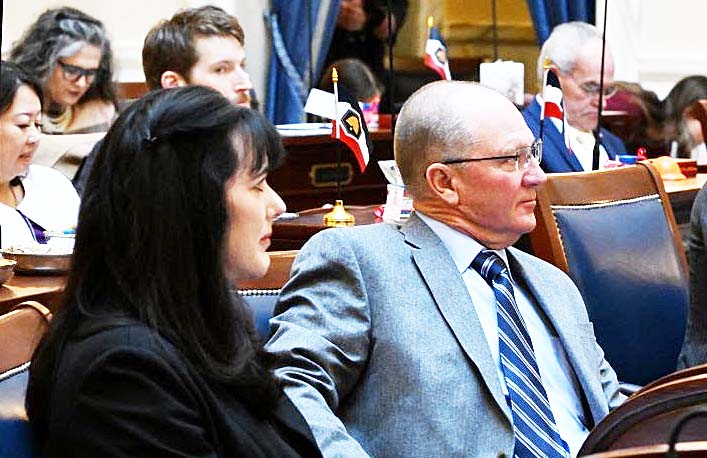Sen. Scott Sandall (R-Tremonton) listens as the Utah Senate deliberates his proposed law creating a framework for the state to limit the impact of over-reaching federal policies and regulations. Senate Bill 57 was signed into law by Gov. Spencer Cox on Jan. 31 (Image courtesy of Facebook).
SALT LAKE CITY – With a constitutional crisis simmering along the Texas-Mexico border, Gov. Spencer Cox has signed a new law that is both topical and timely.
Authored by Sen. Scott Sandall (R-Tremonton), Senate Bill 57 (Utah Constitutional Sovereignity Act) was enacted on Jan. 31, setting up a framework for the Utah Legislature to restore proper balance when the federal government over-reaches its authority.
“Balancing power between state and federal sovereignity is an essential part of our constitutional system,” Cox said after signing Sandall’s bill.
Under the new law, by a two-thirds vote in the Legislature, Utah could issue a concurrent resolution opposing any law or directives that lawmakers believe constitutes an over-reach of federal authority.
That resolution would shield state officials from following disputed federal directives while those issues work their way through the courts.
Sandall said that SB 57 merely protects Utah’s interests against rules and regulations by the federal government that are over-reaching and unconstitutional based on the rights reserved to the states under the 10th Amendment to the U.S. Constitution.
Democratic lawmakers were largely opposed to the new law, saying it is an open invitation to a legal challenge by federal officials.
Although none of them are quite as serious as the dispute over unchecked illegal immigration now playing out in Texas, Utah nevertheless has several bones to pick with the federal government.
Those include management of federal lands in Utah, particularly their mineral rights; opposition to the Ozone Transfer Rule issued by the U.S. Environmental Protection Agency that would force Utah and 22 other states to shut-down coal-fired plants that provide affordable and reliable baseload energy; a rejection of unrealistic and harmful federal mandates that two-thirds of all new vehicles manufactured in the U.S. be all electric by 2032; and others.
“That’s why I proposed (SB 57) in the Legislature to defend Utah’s interests by creating a process for us to stand up against unconstitutional federal policies and regulations that negatively impact our state,” Sandall explained.
“This legislation gives us another way to push back on federal over-reach and maintain the balance (between state and federal authority),” Cox added.

